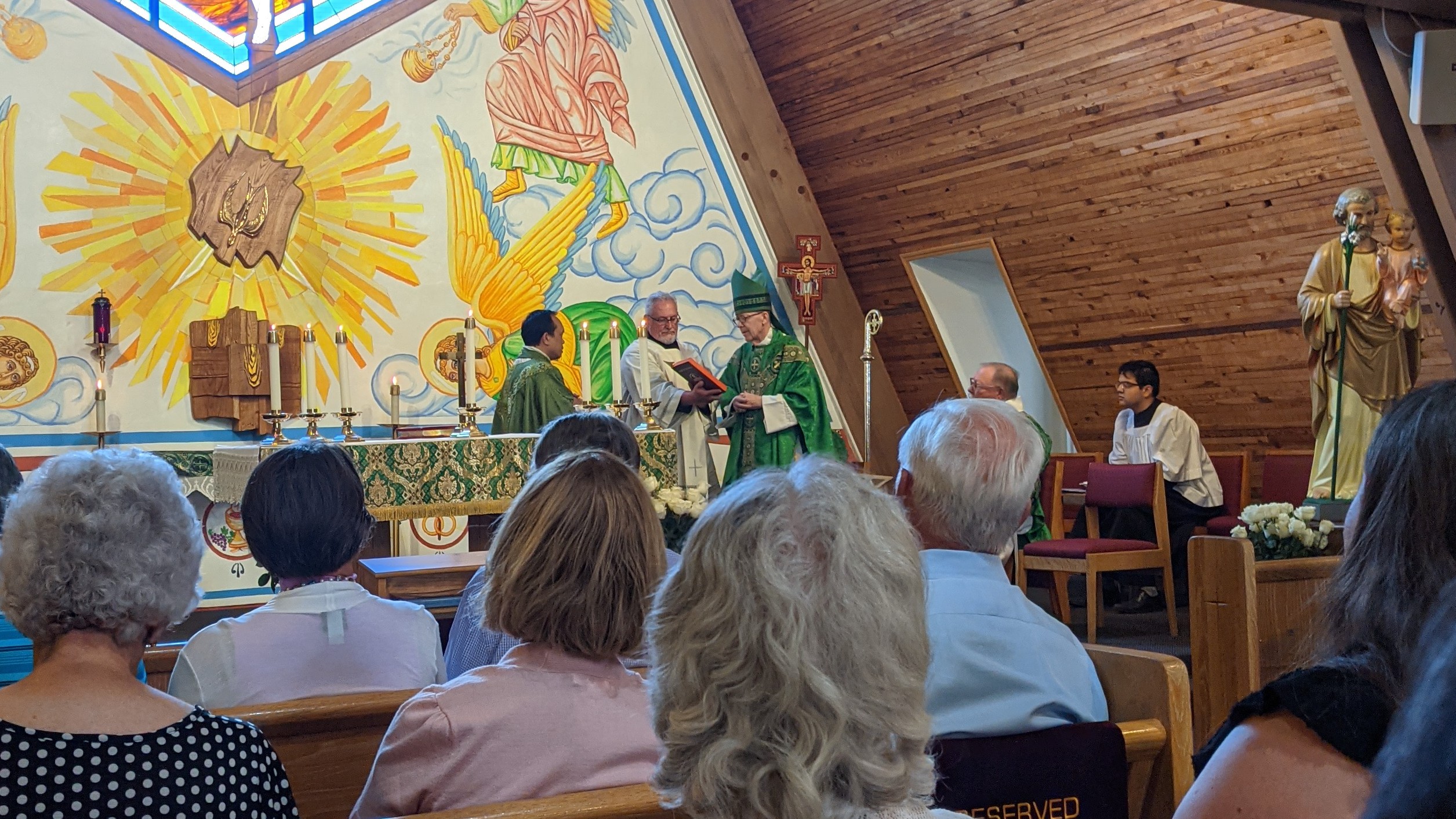“Be doers of the word, not hearers only”
August 29, 2021
Following is the prepared text from Bishop Olmsted’s homily for the 22nd Sunday in Ordinary Time and the Installation of Fr. Thielo Ramierez as pastor of St. Joseph the Worker, Williams; St. Anne Mission, Ashfork; and St. Francis, Seligman.
In the Rite of Installation, a new pastor is asked to lead his people in the profession of our faith. This makes clear that it is the Pastor’s responsibility to help his people hear the voice of God in the Sacred Scriptures, take it to heart, put it into practice, and bear witness to our faith in God.
Moses was acting like a pastor when, as he was leading God’s people out of slavery in Egypt to freedom in the Promised Land, he said (Dt 4:1ff), “Now, Israel, hear …[that] which I am teaching you to observe, that you may live.”
“Now” is the key word Moses spoke to his people as they were facing tough times in their journey to freedom. To hear God’s word “now” is what a good pastor helps his people to do, no matter what troubles they are facing, no matter how tough things have become, in good times and in bad, he assures them that the Lord and His powerful word is at hand.
St. Paul insisted on this truth when he wrote his Second Letter to the Corinthians (2 Cor 6:2), “Now is a very acceptable time. Now is the day of salvation.” Paul was keenly aware of the human tendency to procrastination and of God’s desire to be “Father” to every person, now and at every moment; and how He wanted each one to hear Him say with joy, “You are my beloved son [my beloved daughter].” This Good News is of such upmost importance that it must not be delayed in any way. A deep urgency to proclaim this Good News moved St. Paul and should move all of us to believe, Now is a very acceptable time. Now is the day of salvation.” God’s word is not a museum piece of the past. “Indeed,” says Hebrews 4:12, “the word of God is living and effective, sharper than any two-edged sword …” Because of the effective power of God’s word, preaching must be a high priority for a pastor.
The Catechism teaches (CCC #1), “…at every time and in every place, God draws close to each human person…In His Son and through Him, He invites people to become, in the Holy Spirit, His adopted children and thus heirs of His blessed life.” How important it is that a Pastor is deeply confident that Christ our Savior is present and at work in our world now, present and at work in his parish now, and in every family. Moreover, Christ loves us so much that He comes near, above all, when we least deserve His mercy.
Still, this firm belief in the presence and mercy of God among us, now, does not blind a pastor to the terrible toll of sorrow caused by COVID-19, by the earthquake in Haiti, the violent killings in Afghanistan and other places of persecution; or the horrible anguish we ourselves bring about by our faults and sins. Therefore, a pastor understands why Jesus speaks forthrightly in the Gospel today about our need for His mercy, by indicating the works of darkness that come from human hearts (Mk 7: 22f): “From within people, from their hearts, come evil thoughts, unchastity, theft, murder, adultery, greed, malice, deceit, licentiousness, envy, blasphemy, arrogance, folly. All these evils come from within and they defile.”
Now, and every day, the thing that should most concern us is the impurity caused by sinful thoughts and acts, which have their origins deep within our hearts. When we sin in one of these ways, we should go to confession as soon as possible and be forgiven and healed by Christ. Our Lord assures us (Mt 9:13), “I desire mercy, not sacrifice. I did not come to call the righteous but sinners.”
There are three primary roles by which a good pastor serves those entrusted to his care: as a loving father, a gentle shepherd, and a wise teacher. Each of these roles help people to deal with suffering, sin, and sorrow in their lives.
As a loving Father, a pastor celebrates with his people the Holy Sacrifice of the Mass, in which Christ Himself feeds the flock with His own Body and Blood and makes them part of His perfect worship of the Father in heaven. He also feeds them, at Mass, with His Holy Word which shines the light of truth into the darkness of our world, and into whatever is darkened in our personal lives.
As a good shepherd, Jesus sends His priests to seek out and bring back those who are lost. Precisely for the sake of the lost, we give thanks to Christ for raising up pastors after His own Heart.
Already in the Old Testament, God promised us through the prophet Jeremiah (3:15), “I will give you shepherds after my own heart.” These words bolster our hope as I install your new pastor, today, and as he surrenders his mind, his voice, his heart, his strength to be the means by which Christ Himself shepherds His flock. Nowhere is this more evident than in the Sacraments, especially in Confession when he says, “I absolve you in the Name of the Father and of the Son and of the Holy Spirit,” and in the Eucharist when Jesus uses the priest’s voice to say to His people: “Take and eat, this is my Body. Take and Drink, this is my Blood.”





